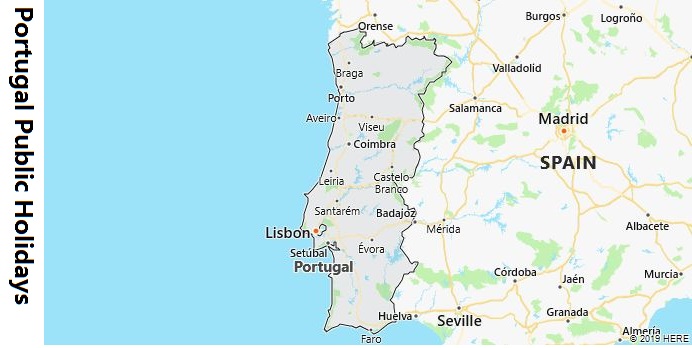Portugal Public Holidays
Portugal Public Holidays
Searching for the national holidays in Portugal? All public holidays in Portugal are treated like Sundays. This means that most of the Portugal employees have a day off and all schools are closed on these office holidays. If you are planning a trip to Portugal and want to know what the national and regional holidays are, check the details in the tables below.
New Year’s Day (January 1)
Description
New Year’s Day, celebrated on January 1st, marks the beginning of the year in the Gregorian calendar. In Portugal, this holiday is observed with family gatherings, festive meals, and celebrations. It is a day for reflecting on the past year and making resolutions for the new year. Portuguese cities and towns often host events such as fireworks displays and concerts to ring in the new year, though the focus for many people remains on family and quiet celebration.
Many Portuguese citizens attend Mass on New Year’s Day, particularly those who observe religious traditions. The holiday’s festive nature is accompanied by feasts, where traditional Portuguese dishes like bacalhau (salt cod) and a variety of sweets are served. The New Year’s Day celebrations are a time of joy, renewal, and communal spirit.
Duration
New Year’s Day is a one-day holiday, with government offices, businesses, and schools closed for the day.
Groups Affected
- General Public: All citizens of Portugal.
- Government Employees: Typically given the day off.
- Private Sector: Most businesses close for the day, though essential services remain operational.
Carnival (Variable Date, February or March)
Description
Carnival in Portugal, especially famous in places like Lisbon, Ovar, and Madeira, is one of the most vibrant and widely celebrated events of the year. Carnival takes place in the period leading up to Lent, typically in February or March, depending on when Easter falls. It is a time of exuberance, with parades, masquerades, music, and dancing. The holiday represents the end of winter and the beginning of spring, and it has roots in both ancient traditions and Christian practices.
The celebrations feature colorful costumes, street parades with elaborate floats, performances, and parties. The carnival processions are often accompanied by the sounds of samba, marching bands, and folk music. Some cities, such as Madeira, have world-renowned carnival celebrations, attracting tourists and locals alike. While it is a joyous event, Carnival also serves as a social occasion where people come together in celebration and revelry.
Duration
Carnival lasts several days, with the public holiday typically falling on Shrove Tuesday, just before Ash Wednesday. Government offices, businesses, and schools are closed for the day.
Groups Affected
- General Public: All citizens, especially those in urban centers and areas with Carnival celebrations.
- Government Employees: Given the day off for the main celebrations.
- Private Sector: Many businesses are closed, though essential services may remain open.
Good Friday (Variable Date, March or April)
Description
Good Friday is a Christian observance that commemorates the crucifixion of Jesus Christ. The date of Good Friday varies each year, depending on when Easter falls, typically occurring in March or April. In Portugal, it is a solemn and reflective day, marked by church services and religious processions. Many people attend Mass and participate in activities such as reenactments of the Passion of Christ.
In some regions, towns and villages hold processions in the streets, where individuals dressed as biblical figures re-enact scenes from the final days of Jesus. The day is marked by a quiet atmosphere, with a focus on spiritual reflection, fasting, and prayer. While it is primarily a religious holiday, many businesses and schools are closed in observance.
Duration
Good Friday is a one-day holiday, with businesses, government offices, and schools typically closed for the day.
Groups Affected
- General Public: Primarily Christians.
- Government Employees: Given the day off.
- Private Sector: Most businesses close for the day, except for essential services.
Easter Sunday (Variable Date, March or April)
Description
Easter Sunday, which celebrates the resurrection of Jesus Christ, is one of the most important holidays in Portugal. While Good Friday marks a solemn occasion, Easter Sunday is a day of celebration and joy. People attend church services to celebrate Christ’s resurrection, and it is a day for family gatherings, feasting, and festive activities. Traditional Portuguese foods such as lamb, roasted meats, and sweet pastries like folar (Easter bread) are commonly served.
The holiday is also marked by various local traditions and cultural practices. In some regions, Easter is celebrated with processions, music, and dance. The atmosphere is festive, and it is a time for people to come together, celebrate their faith, and share meals with loved ones.
Duration
Easter Sunday is a one-day holiday, with businesses, government offices, and schools closed.
Groups Affected
- General Public: All citizens, especially Christians.
- Government Employees: Given the day off.
- Private Sector: Most businesses close for the day, though essential services remain operational.
Labour Day (May 1)
Description
Labour Day, celebrated on May 1st, is a public holiday that honors the contributions of workers. It is an international celebration, also known as International Workers’ Day, and is recognized in Portugal as a day to promote labor rights and reflect on the progress made by workers’ movements. On this day, there are public demonstrations, rallies, and speeches in cities and towns across the country.
The holiday is a reminder of the importance of fair working conditions, wages, and labor rights. In Lisbon and other major cities, parades and gatherings are organized by trade unions and political groups to highlight ongoing issues related to labor and social justice. Many workers take the day off, and it is also a time for families to enjoy leisure activities, such as picnics and outings.
Duration
Labour Day is a one-day holiday, with businesses, government offices, and schools closed.
Groups Affected
- General Public: All citizens, especially workers and union members.
- Government Employees: Given the day off.
- Private Sector: Most businesses close for the day, though essential services remain open.
Portugal Day (June 10)
Description
Portugal Day, celebrated on June 10th, is the national day of Portugal. It honors the death of Luís de Camões, one of the country’s most revered poets, and celebrates Portuguese culture, history, and identity. The day is marked by official ceremonies, speeches, parades, and various cultural events across the country.
The focus of Portugal Day is on national pride, and it is a time for the Portuguese people to reflect on their history and achievements. In Lisbon, the capital, there are official events and public celebrations, while in other parts of the country, smaller festivities take place. The day also features performances of traditional Portuguese music, including Fado, a genre that has become emblematic of the nation’s cultural heritage.
Duration
Portugal Day is a one-day holiday, with businesses, government offices, and schools closed for the day.
Groups Affected
- General Public: All citizens of Portugal.
- Government Employees: Given the day off.
- Private Sector: Most businesses are closed, though essential services remain operational.
Assumption Day (August 15)
Description
Assumption Day, observed on August 15th, celebrates the belief that the Virgin Mary was assumed into heaven. It is a significant religious holiday, especially for Catholics, who make up the majority of the Portuguese population. The day is marked by church services, prayers, and processions dedicated to the Virgin Mary.
Assumption Day also marks the height of summer, and many people use the holiday to enjoy leisure activities with family and friends. Traditional feasts and celebrations often take place in rural areas and small towns, where people gather to enjoy regional dishes, music, and dancing.
Duration
Assumption Day is a one-day holiday, with businesses, government offices, and schools closed.
Groups Affected
- General Public: Primarily Christians, especially Catholics.
- Government Employees: Given the day off.
- Private Sector: Most businesses close for the day, though essential services remain operational.
All Saints’ Day (November 1)
Description
All Saints’ Day, celebrated on November 1st, is a Christian holiday dedicated to honoring all saints, known and unknown. In Portugal, it is a solemn day of reflection, prayer, and remembrance. Many people attend church services to honor the saints and reflect on the lives of the faithful who have passed.
The day is also a time for visiting cemeteries and remembering loved ones who have died. Portuguese families often clean and decorate the graves of their relatives, laying flowers and lighting candles in tribute. It is a deeply reflective day, marked by a quiet atmosphere throughout the country.
Duration
All Saints’ Day is a one-day holiday, with businesses, government offices, and schools closed.
Groups Affected
- General Public: All citizens, especially Christians.
- Government Employees: Given the day off.
- Private Sector: Most businesses close for the day, although essential services remain operational.
Christmas Day (December 25)
Description
Christmas Day, celebrated on December 25th, marks the birth of Jesus Christ and is one of the most significant holidays in Portugal. The day is observed with church services, family gatherings, and festive meals. The Christmas holiday season in Portugal is marked by a deep religious significance, and people celebrate the birth of Christ with joy and devotion.
In Portugal, Christmas celebrations begin on Christmas Eve, with many families attending Mass and enjoying a festive dinner together. On Christmas Day, people exchange gifts, spend time with loved ones, and enjoy traditional Portuguese dishes such as bacalhau (salted cod), turkey, and various pastries. The Christmas season also features decorations, Christmas markets, and performances of traditional Portuguese music.
Duration
Christmas Day is a one-day holiday, with businesses, government offices, and schools closed.
Groups Affected
- General Public: All citizens of Portugal, especially Christians.
- Government Employees: Given the day off.
- Private Sector: Most businesses close for the day, though essential services remain operational.
Table: Overview of Public Holidays in Portugal
| Public Holiday | Date | Duration | Groups Affected |
|---|---|---|---|
| New Year’s Day | January 1 | 1 day | General Public, Government Employees |
| Carnival | Variable (February/March) | Several days | General Public, Government Employees |
| Good Friday | Variable (March/April) | 1 day | General Public (Christians) |
| Easter Sunday | Variable (March/April) | 1 day | General Public (Christians) |
| Labour Day | May 1 | 1 day | General Public, Workers |
| Portugal Day | June 10 | 1 day | General Public, Government Employees |
| Assumption Day | August 15 | 1 day | General Public (Christians) |
| All Saints’ Day | November 1 | 1 day | General Public (Christians) |
| Christmas Day | December 25 | 1 day | General Public (Christians) |















































